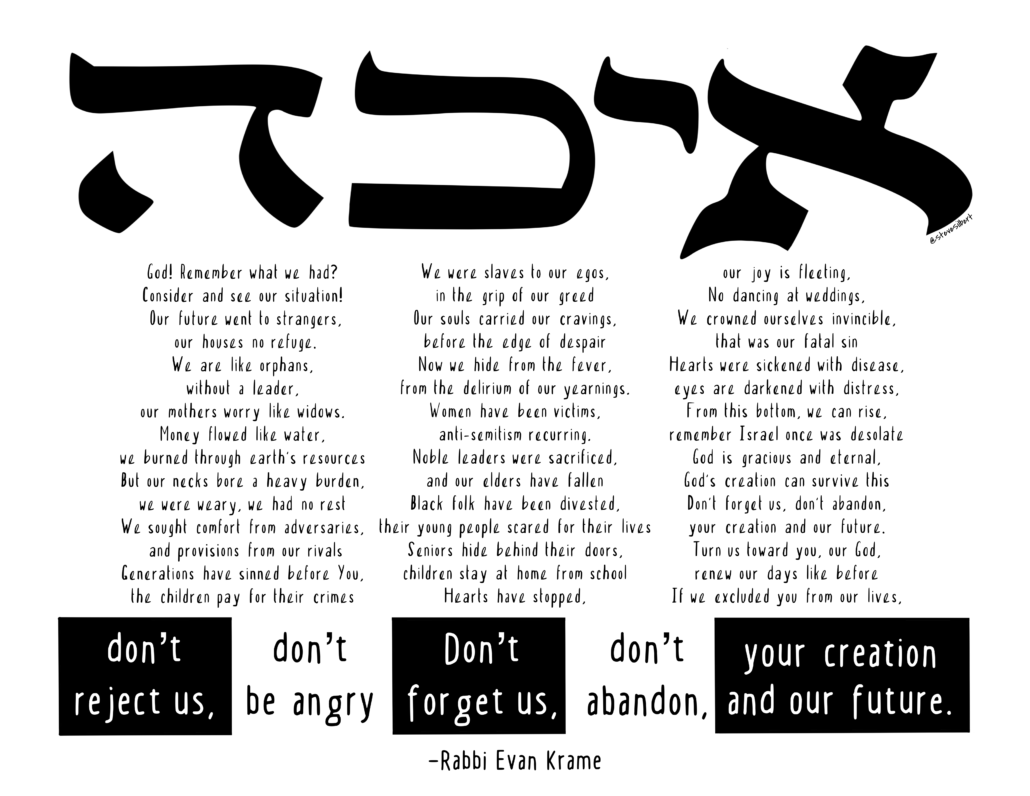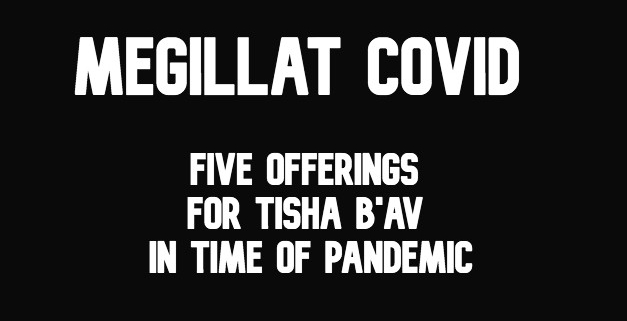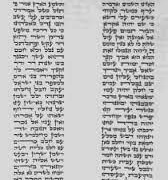Megillat Covid: Five Offerings for Tisha b’Av

Here are five offerings for Tisha b’Av, each available as its own downloadable PDF. They are intended for both personal and communal use, and can be used singly or all together. Any of them could be read on their own, or as a prelude to Eicha / Lamentations. The final one has been set to Eicha trope.
Crying Out by R’ Rachel Barenblat draws on images from the pandemic and asks the question: who will we be when the pandemic is gone? Here is a brief excerpt (you can read the whole piece in the PDF file below):
Lonely sits the city once great with people —
her subways now empty, her classrooms closed.
Refrigerator trucks await the bodies of the dead
wrapped in sheets of plastic and stacked like logs.
Mourners keep a painful distance, unable to embrace…
Along the Lines of Lamentations by R’ Sonja K. Pilz is similar to a cento (a poem that repurposes lines from another poem), as it consists primarily of quotations from Eicha, re-contextualized by their juxtaposition and by this pandemic season. Here is a brief excerpt (the whole appears in the PDF below):
We were laid waste (2:5).
We were stripped like a garden;
Ended have Shabbat and festivals (2:6).
Our gates have sunk into the ground (2:9).
Elders sit silently;
Women bow their heads to the ground (2:10).
My eyes are spent;
My being melts away (2:11)….
Jeremiahs without a jeremiad by devon spier offers fragmented lines evoking our fragmented hearts in this time of pandemic. About her contribution, devon writes:
To be used to cultivate an embodied COVID megillah reading that honours the fall of Jerusalem and the ebb and flow of our bodies in the months of the Coronavirus and related social distancing.
To honour that for those of us with pre-existing conditions (our own frail, flimsy, fabulous humanness, our addictions, chronic health issues, years of unfelt griefs suddenly flung to the surface…each of these), we can wrap our whole selves in the scroll of this weeping day. And we can arrive, just as we are.
I would frame this as a kavannah as lines of ketuvim (lines of poetical post-exilic writings) the speaker can read before beginning chanting to set an intention. Or, the lines of this work could also be read throughout the chanting, as the verses I cite appear throughout the first chapter of Eicha.
‘V’ha-ikar…” and the essence: Pause for the moments you feel the most human. Feel. And insert the words of this piece exactly where you are. From the lines of this intention and a gentle remembrance on this solemn day where we still face ourselves, our ancestors, our communities and each other, in and beyond, always, with hope: “Jerusalem is me is you.”
Here is a brief excerpt (the whole appears in the PDF below):
lamentations
for those with pages
of unwritten loss
lamenting
Jerusalem
and everything else
they never had
but Are
somehow
we are…
Alas by Trisha Arlin evokes the full journey of Eicha, from weeping for the city in distress to remembrance and the promise of change. Here is a brief excerpt (the whole appears in the PDF below):
…Eating, Sleeping, Walking
Alone
TV, Facebook, Prayer
Alone
Coughing, Crying, Dying
AloneAlas, loneliness!
I am so frightened.
I weep and who will hear me?…
Remember by Rabbi Evan Krame evokes the end of Lamentations, beseeching God to remember us and to let us return. Here is a brief excerpt (the whole appears in the PDF below):
God! Remember what we had? Consider and see our situation!
Our future went to strangers, our houses no refuge.
We are like orphans, without a leader, our mothers worry like widows…
Here also is a recording of R’ Krame’s words sung in Eicha trope, recorded by Rabbi Jennifer Singer.
Together these five offerings make up this year’s “Megillat Covid,” the scroll of our mourning and our search for meaning during these pandemic times. Each is available for download as a PDF file here:
MegillatCovid-Barenblat-CryingOut (PDF)
MegillatCovid-Pilz-AlongTheLines (PDF)
MegillatCovid-Spier-Jeremiahs (PDF)
MegillatCovid-Arlin-Alas (PDF)
MegillatCovid-Krame-Remember (PDF) and audio recording by R’ Jennifer Singer:
And here’s a sketchnote of R’ Krame’s words, created by Steve Silbert:

Contributors:






Rabbi Rachel Barenblat is a founding builder at Bayit and author of several volumes of poetry who blogs as the Velveteen Rabbi.
Rabbi Sonja K. Pilz, PhD is the Editor of the CCAR Press. She taught Worship, Liturgy, and Ritual at HUC-JIR in New York and the School of Jewish Theology at Potsdam University, and authored one book, some articles, and many poems, midrashim, and prayers. Her work has been published in Liturgy, Worship, the CCAR Journal, a number of anthologies, and online.
Devon Spier is a rabbinic student, an author, and a visual poet theologian (proemologian), who both weaves and teaches others to weave their stories through poems, prose and theology of digital images.
Trisha Arlin is a liturgist, performer and student of prayer in Brooklyn, NY. She is author of Place Yourself: Words of Prayer and Intention.
Rabbi Evan Krame is a founding builder at Bayit and co-founder of The Jewish Studio.
Steve Silbert is the Bayit builder behind VisualTorah and Sketchnoting Jewishly.









